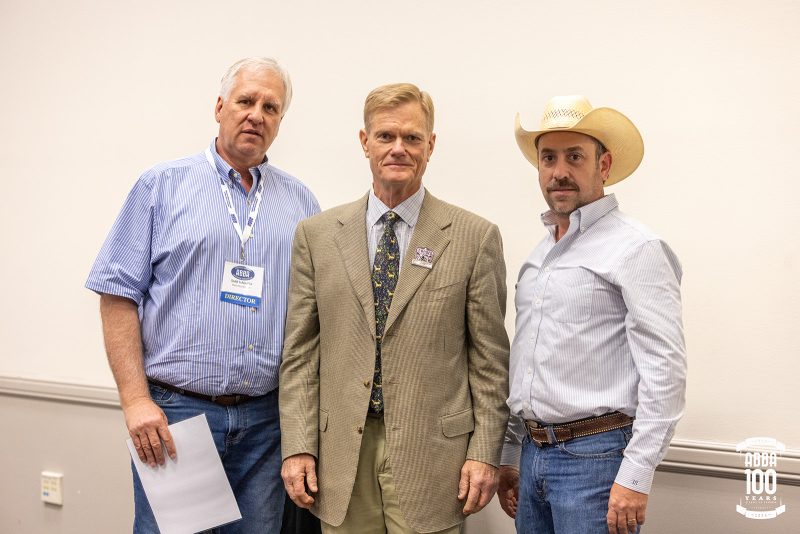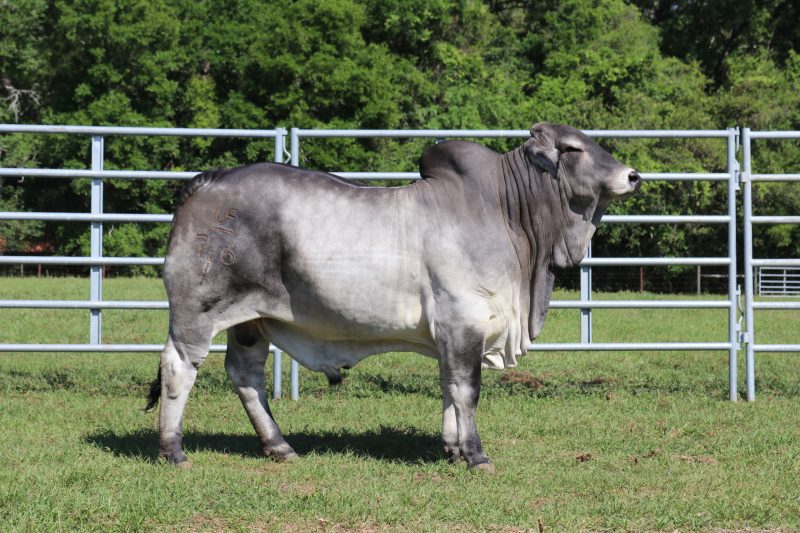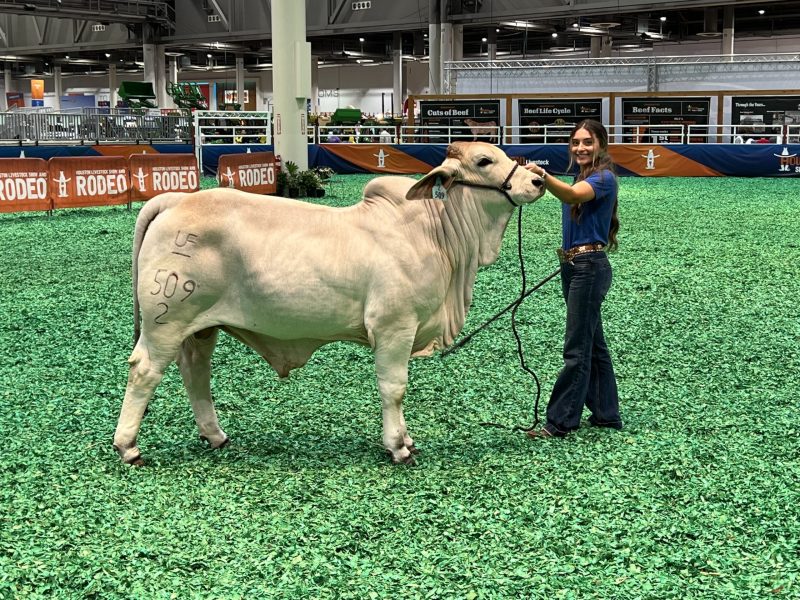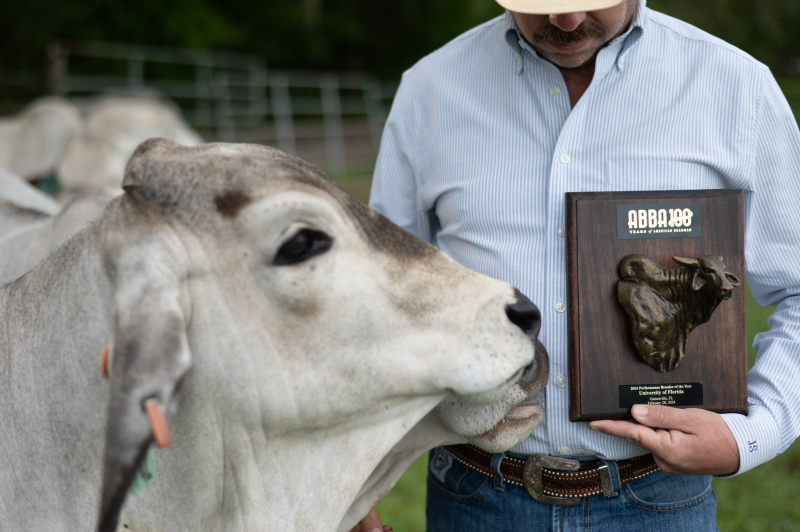American Brahman Breeders Association
The American Brahman Breeders Association (ABBA) is proud to announce the winner of the 2024 Performance Breeder of the Year is the University of Florida. The University of Florida was chosen by the Research & Breed Improvement Committee due to the completeness of their program and herd. In terms of performance data, University of Florida submits a full set of weights, DNA, and ultrasound scans on their herd, submitted multiple bulls to ABBA’s Bull Development & Marketing Program, and has made notable strides in fertility for Brahman females, reporting 58% of the yearling heifers in their program have become pregnant to calve at 2 years of age in a 70-day breeding season. They have also obtained their first Elite Maternal Merit female in 2023, and boast 4 of the top 10 Gray Sires for the breed in Birth Weight EPD at the time of nomination.
University of Florida is currently also a research partner with ABBA, with multiple projects focusing on genetic improvement for carcass quality, genetic resistance to horn flies, embryo transfer methods, embryo viability, feeding strategies, and more, all utilizing Brahman cattle. University of Florida has created many leaders in the Brahman world and the broader beef industry through the integration of their Brahman herd into to education and outreach efforts, with classes focusing on digital and physical marketing & sales of Brahman cattle that culminate in the University of Florida’s annual sale that is 100% student run, as well as hosting a Brahman show string, both major undertakings for a university system.
Please join us in congratulating the University of Florida on this prestigious award!

Todd Schindler, ABBA Director (left), and Mike Forgason, ABBA President (center), presented the American Brahman Breeders Association’s 2024 Performance Breeder of the Year to the University of Florida. Jesse Savell (right), represented the University of Florida’s Animal Science Department. Source: ABBA
–
Jesse Savell, UF Animal Science Department Beef Program Manager
The University of Florida (UF) registered its first Brahman cattle in 1949 under the herd number 1113. These cattle were located at the Range Cattle Experiment Station, in Ona, Florida. The foundation of the original herd came in the form of donated heifers from Eastern Brahman Breeders Association members like W.H. Stuart Ranch, A. Duda, and Sons Inc., and United States Sugar Corp. At this time, much emphasis was placed on research associated with crossbreeding and the effects of heterosis on beef production.
More recently, the Brahman herd from the USDA Subtropical Agriculture Research Station (STARS) was moved to Gainesville when the station closed in 2012. Approximately 70 mature cows were transferred under member number 55587. Since that time, there has been an aggressive strategy to improve fertility in the Brahman herd. Specific attention has been placed on early attainment of puberty and reducing calving interval through culling and selection. The current herd consists of approximately 200 mature Brahman cows, 64 yearling Brahman heifers, 12 Brahman herd sires, and 50 ET recipients. These animals are housed at the University of Florida Beef Research Unit in Gainesville, FL.
UF began exposing their yearling Brahman heifers in 2017 and has continued every year since. This past year, 58% (34 of 59) of the yearling heifers conceived to calve at 2 years of age in a 70-day breeding season. For the past 3 years, UF has also evaluated the carcass composition of approximately 64 female replacements each year using ultrasound measurements. This past year, UF also evaluated the female replacements for average daily gain, feed efficiency, and residual feed intake using the Vytelle Sense system, formerly known as Grow Safe. These heifers are currently enrolled in a methane emissions trial.
In 2018 UF began a similar evaluation of the male calves. The top 48 bull calves at weaning are performance-tested for average daily gain, feed efficiency, and residual feed intake. These 48 bulls also undergo serial ultrasound measurements for carcass composition at 12 and 15 months of age. They also perform serial breeding soundness exams on these bulls at 15 and 18 months of age to identify those bulls who achieve early puberty. The top 15 bulls from this selection process are offered in the annual UF Bull and Heifer Sale in early May. The remainder of the bulls are castrated, finished, and harvested at UF to obtain feeding and carcass data.

UF Mr. Gator 716/1 sold in the 2023 UF Brahman Bull and Heifer Sale. Source: UF/IFAS Animal Science Department
–
The selection process for both male and female progeny begins at birth. Animals with excessive birth weight, difficult birth, failure to suckle, or requiring other medical intervention are culled from the program. At weaning, all calves are evaluated by a committee based on structural correctness, disposition, phenotype, growth performance, hip height, and body condition score. Selections are weighted to a lesser extent with the influence of the pedigree, EPDs, and performance of the parents. These latter parameters have been taken into account before conception. At weaning, approximately 65% of the heifers will be retained as potential replacements and 50% of the bulls. The vast majority of these females will enter the herd. Only 15% of the bull calves will ultimately make it into service as breeding bulls. An additional 2% of the bulls are kept as potential herd sires.
UF has selected these cattle ruthlessly for economically important traits like good feet, good udders, calving ease, and good disposition. These traits are vitally important for beef production at all levels and help to add to the viability of the UF program over time. UF owns 4 of the top 10 Grey Brahman Trait Leaders for Birth Weight EPD, and are breeding to 2 additional BW trait leaders through AI. In 2023, 46% of the calves born at UF were produced by artificial insemination. An additional 14% were produced by the use of embryo transfer. UF has its own advanced repro lab and produces the majority of these embryos themselves. UF has also established minimum thresholds for fertility. They do not OPU a female unless she calved at 2 years of age. They also will not keep a herd sire prospect that does not pass a full BSE by 15 months of age and must be produced by a cow that calved at 2. UF also culls every female that comes up open for a second time, regardless of her pedigree, phenotype, or performance.
In 2023, UF weaned 169 purebred Brahman calves and 34 F1 progeny who were born within a single 90-day calving season. They also implemented total herd reporting in 2023 by registering every calf. This will be very important to improve the accuracy of EPDs as well as increase the number of cows who qualify for Maternal Merit designation. As I have looked through the records, UF has several cows who would have qualified for Maternal Merit status, except that some of the progeny weren’t registered; typically their first calf as a 2-year-old. It is also important to note that UF had their first cow qualify for Elite Maternal Merit this year. UF is looking forward to many more Maternal Merit cows with the newly implemented total herd reporting.
The Genomics faculty at the University of Florida (Dr. Rezende and Dr. Mateescu) maintain a genomic database of all UF animals that allows them to make the best mating decisions possible. It is important to recognize that Dr. Mateescu was named the 2023 ABBA Brahman Friend of the Year for her exceptional work in the field of Brahman genomics. UF also utilizes a crossbred herd of approximately 300 mature cows for proving young bulls and gaining more information. Many of these progeny are sired by Brahman bulls and will be fed and harvested at a commercial feedlot to obtain relevant industry-based information.
This will be the 3rd year UF has fielded a Brahman Show Team. Students are enrolled in a hands-on course to halter-break and exhibit Brahman animals at the Florida State Fair and the Kissimmee Valley Livestock Expo. In 2023, UF took their first animals to Houston where students successfully exhibited 1 heifer and 1 bull. Dr. Todd Thrift is in his 6th year of teaching a Seedstock Management course focused on the production, registration, selection, and sale of Brahman cattle.

Mikaela Martin, Animal Science student and Brahman Show Team member showing a UF Heifer in Houston, Texas. Source: UF/IFAS Animal Science Department
–
UF has recently shifted its focus to improving carcass quality, with an initial focus on marbling. They are doing this through the selection of superior sires with proven carcass quality and exceptional EPDs for marbling. UF is also multiplying their highest marbling females, that meet the puberty requirement, through the use of OPU. These decisions are made using genomics, EPDs, ultrasound data, and progeny carcass data. Hopefully, there will be more exciting news to offer in this area in the near future. The goal is to have several UF sires qualify as Trait Leaders for Marbling EPD. UF has recently incorporated polled genetics into the herd in a more significant way through the purchase of 2 polled herd sires in the past year.
The University of Florida has been actively involved in several Brahman activities. UF hosted the Brahman Foundation Leadership Camp in the summer of 2022. UF also hosted the Florida Brahman Field Day and Heifer Sale in 2023 with plans to host again in 2024 and 2025. This event is the annual meeting and largest fundraiser for the Florida Brahman Association and also serves as the annual meeting for the Florida Junior Brahman Association. The current herd manager, Jesse Savell, sits on the Executive Committee of the Florida Brahman Association and serves as their secretary. UF participated in the 2023 ABBA Performance Tested Bull Program and successfully sold the 4th high-selling bull this past year. Faculty members Dr. Todd Thrift and Dr. Chad Carr are both approved ABBA judges. Several faculty members sit on boards of other beef cattle-related organizations, but the numbers are too numerous to include individually. UF also implements the Beef Quality Assurance Program for the state of Florida and hosts several tours each year that highlight the Brahman breed and its influence on beef cattle production.
I have established an unofficial motto for the program; “Moving Forward” which I believe encompasses UF’s commitment to the improvement of the breed through the use of accurate, relevant, applicable data. This could not have been accomplished without the steadfast support of fellow Brahman Breeders. They have selflessly allowed UF access to their very best cattle in an effort to improve the breed for everyone. The University of Florida is honored to accept the ABBA Performance Breeder of the Year Award!

Jesse Savell, University of Florida Beef Program Manager holds the ABBA Performance Breeder of the Year Award plaque. Source: UF/IFAS Animal Science Department
–
